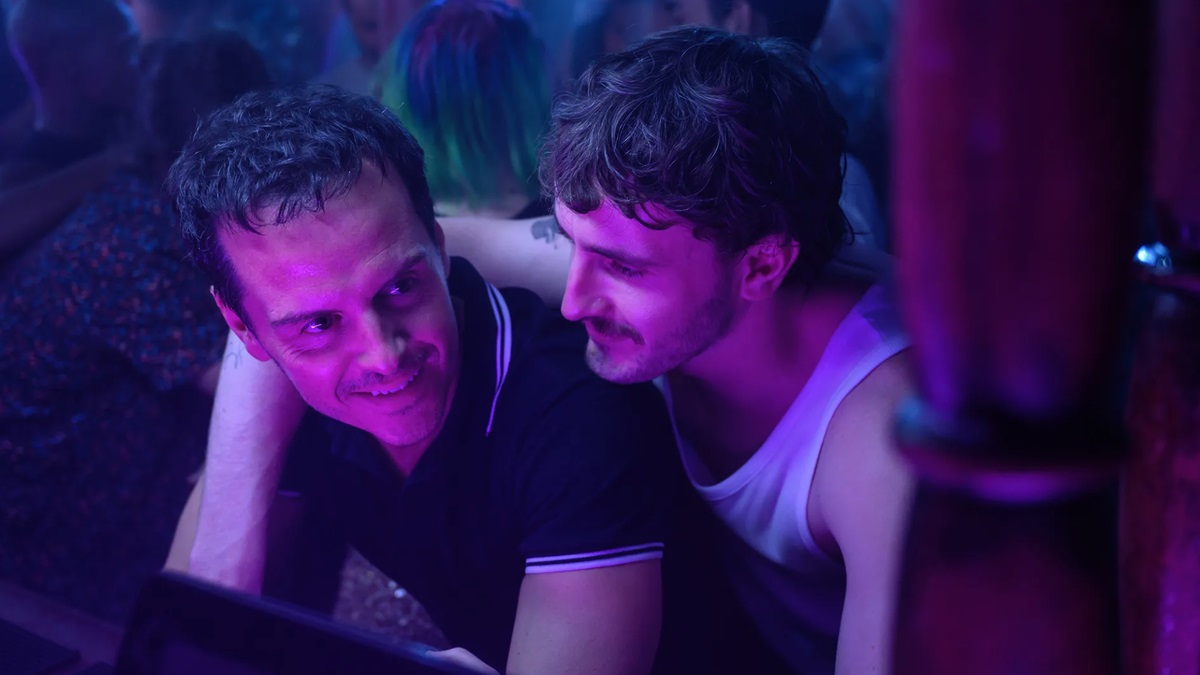Everyone wants to be loved. Mr. Rogers once said the greatest thing we can do is convince someone that they’re loved and capable of loving. Andrews Haigh and Scott are here to give us the other side of that happy coin. All of Us Strangers gives us a glimpse of those giftless individuals, unaware of anyone caring about them and fearful that they aren’t capable of giving those gifts to others. And, the movie is a not so subtle recommendation to maybe send that text to mom & dad to tell em that you love them.
Writer Adam (Andrew Scott) is slowly withering away alone at his computer in his London flat. After rebuffing the drunken Harry (Paul Mescal) at his door one night, Adam decides to visit his childhood home for inspiration. And lo and behold, his long departed parents (Jamie Bell and Claire Foy) are miraculously there again, ready and willing to talk to their adult son. This motivates Adam to put himself back out there, finding Harry again and seeing if there’s something more to him thank a drunken sulky hunk of a man.
It’s truly breathtaking what Andrew Haigh has conjured here. Grief is really hard to depict onscreen in a watchable manner; no one really likes leaving the theatre bummed and sullen. So the talented director adds a bit of magic to his melancholy. Was results is achingly beautiful: an emotionally messy fantasy where the lonely Adam gets to confront and move on from his tragic past. Through these conversations he realizes a truth most of us know but don’t see: everyone is lonely from time to time. And the loneliest souls are ones trying to find some sort of connection they so desperately need to keep going, but they are constantly beset by missed opportunities or even worse, derision and indifference. That emptiness grows and grows until something drastic has to happen, forcing someone to listen whether or not they want to. Despite all these really dark themes Andrew Haigh is exploring, the writer directors finds ways to discuss them inside of a writer’s fantasy, making the hurt much less painful, while still emotionally riveting the audience with its brave study of grief and pain.
But the reason we weep tears is because Haigh’s actors give amazing performances across the board. Andrew Scott isn’t just “hot priest” or “Moriarty” anymore; hopefully now he becomes “Oscar Nominee” too. One of the most emotionally raw performers uses that skill to perfection here, giving Adam this yearning gentle sadness that I’m pretty sure everyone has felt at some point. Those feelings slowly transform as he spends time with his parents and Harry, evolving from closed off to excited to live again, wooing the audience along the way. Scott is matched by the excellent and rising Paul Mescal. As raw as Andrew Scott is, Mescal’s Harry is maybe the more tragic figure, since he reaches out first, desperate for some sort of companionship. The pair’s chemistry is intoxicating, as each little tendril of connective tissue leads to sexual, emotional sparks that remind everyone why being loved makes you feel alive. On the more platonic side, Claire Foy and Jamie Bell are also brilliant as Adam’s parents, with Foy the chaste fly in the sweet ointment and Bell being the father we all wish we had more time with.
It’s never too late. I’ve had times where I felt trapped inside a prison of my own making, but simply by wishing someone else who was feeling lonely a happy birthday, or thanking them for their hard work, or simply saying hello, you can find a small light in the darkness that can grow into something beautiful. Not as beautiful as Paul Mescal or Andrew Scott, but let’s be honest, that’s a level of beauty no one can really get to.

